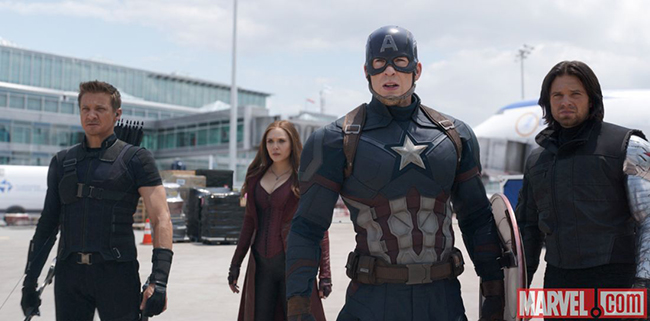These days, only two things are certain in life: death and superhero movies.
Especially since Marvel kicked off the perpetual moneymaking machine of a cinematic comic book universe, it seems like we’re getting another superhero movie every other week — though a decent amount of them are legitimately good films.
Some are good because they’re great genre films in their own right: movies like The Dark Knight or Captain America: Winter Soldier double as a seminal crime drama or a gripping political thriller, respectively. Others, like The Avengers or X2, are good because they fly so closely to the tone of their comic book origins. Marvel’s ambitious new outing lands fantastically in the latter camp.
Captain America: Civil War is the ultimate realization of what a comic book movie can be, for better and for worse — but mostly for better. As Marvel’s cinematic universe grows, its themes and characters multiply like the dollars the franchise is earning, but under the sure-handed direction of the Russo brothers this translates to meatier and more mature superhero extravaganzas.
By now we’re thirteen movies into the Marvel Cinematic Universe (MCU), so directors Joe and Anthony Russo and writers Christopher Markus and Stephen McFeely have quite the world off of which to build. Civil War boasts the largest and most diverse superhero cast to date, featuring nearly every hero from the past twelve installments. Iron Man and Captain America take center stage, as their ideological differences concerning government regulation of The Avengers divides the team into two factions. Tony Stark is wracked with guilt over the innocent lives The Avengers’ battles have inadvertently ended and acquiesces to keep the team under UN check, while Steve Rogers’ general distrust of political organizations with agendas forces him to shift into vigilantism.
A lazy filmmaker would take this beloved comic storyline and direct a messy smorgasbord of heroes fighting each other for three hours, but the Russo brothers use the relational groundwork of the MCU to create compelling conflict: the stakes stem entirely from character relationships. This aspect best captures the special capabilities of a comic book movie. Captain America: Civil War doesn’t enthrall because the world might end again — audiences have witnessed too many apocalypses. It carries significant weight because it hurts to see the normally animated Tony Stark so despondent in the face of former friend Steve Rogers; because a quiet moment between Black Widow and Captain America at a funeral reminds us that these divided people have conquered hell together; because only together can Vision and Scarlet Witch grasp for a reminder of their humanity.
The movie plays out more like a well-written drama than an action movie much of the time, but it’s always engrossing — even at two and a half hours — because every narrative event is carefully paced alongside character development that matters. This allows the filmmakers to effectively handle deeper themes: questions of foreign policy, use of power, and consequences of freedom all land effectively because they surround human beings with powers. Robert Downey Jr. in particular turns in a breathtaking performance rife with tortured self-doubt, reiterating that these are all real people to us.
As you might have heard, a couple of these people are new. I’ll get it out of the way: yes, Tom Holland’s Spiderman is one of the most enjoyable things about Civil War. Yes, after only minutes of screen time, it’s fair to say that this is the best cinematic iteration of Spiderman the world has ever seen. Holland is delightful in the role and the character has never been truer to his comic origins. Chadwick Boseman is simultaneously intimidating and impressive as Black Panther. Both new heroes do feel shoehorned into the movie though.
It’s hard to escape that feeling when there’s so much going on but the Russos pull off a remarkable balance. Civil War consistently operates on a more intelligently written level than your average superhero movie — almost. The MCU’s longstanding problem of phenomenally weak villains threatens to undo the third act. This is a movie that doesn’t even need a prominent villain: the screenplay is so extraordinarily successful in driving conflict due to ideological differences that the villain comes off as unnecessary. He falls into every “bad dude pulling the strings” cliché in a book that’s falling apart with frequent use.
Refreshingly, the third act doesn’t involve hordes of faceless CGI minions or a battle with the universe at stake, but the way it’s set up involves an impossibly intricate plan from the villain that falls apart with even a critical glance in its general direction. It mars the otherwise personal final battle with an unavoidable cheapness, one that requires the viewer to heavily lean on the convincing reasons that these heroes were fighting before — the reasons prompted by the villain rely on far too many coincidences to buy into.
The only other area in which the Russos falter is their action cinematography. Civil War starts out promisingly with practical effects and fluidly shot fights reminiscent of Winter Soldier: the battles are small, personal, and cut just quickly enough to look raw without betraying their impossibility. The movie’s big action set piece, a showdown at an airport between the divided factions of The Avengers, thrives on character interaction far more than it does effortless action direction. It’s more an episodic, stilted connection of one-on-one fights than it is an actual war. Thanks to eccentric personalities, real stakes, and a slew of genuinely hilarious lines (the Russos have a strong background in TV comedy) it still works overall.
And so does the film, despite its weaknesses. Altogether, Captain America: Civil War is without a doubt one of the best Marvel movies ever made, perhaps only to be outdone by the Russos’ tight triumph of Winter Soldier. It’s not only one hell of an enjoyable ride; it’s a sign that comic book movies can handle real themes and empathetic conflict just as well as the best of other genres.
The same team of directors and writers will soon tackle the next two Avengers movies. After this victory, there’s little sign of franchise fatigue from me.
★★★★ (4/5)




